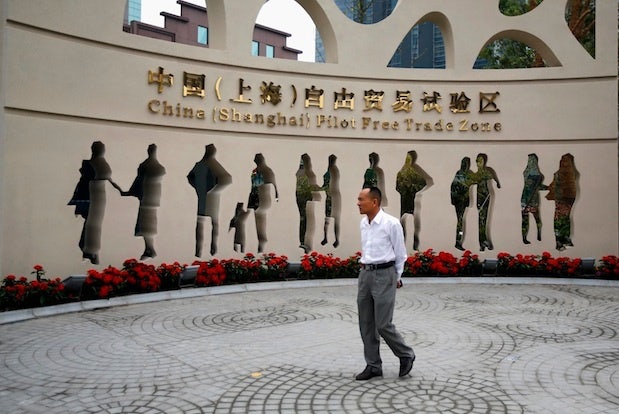
The entrance of the new Shanghai free-trade zone. (Reuters)
Companies in luxury sectors such as retail and auctions could be side beneficiaries of the new Shanghai free-trade zone, which has been heralded as a major step toward market reform in China. Because luxury goods available on the mainland are sold at huge markups, most Chinese make their high-cost purchases abroad or in Hong Kong, but the free-trade zone’s future tax breaks may spark an upsurge in buying of luxury items on the mainland, ranging from handbags to seafood to cultural relics.
Christie’s International, which last month held the first auction for an international auction house on the Chinese mainland, selling works from Andy Warhol and Pablo Picasso, said Shanghai’s free-trade zone, which officially opened on Sunday, will allow it to import more artwork to sell in the country. “We are working with the free-trade zone in any way they see fit and we are hopeful that when the free-trade zone becomes more open we are there to benefit from that,” Steven Murphy, Christie’s chief executive officer, told reporters in Shanghai on September 24.
The government is considering deregulation that would allow foreign auction houses to conduct auctions of cultural relics in the free-trade zone, according to a report by Bloomberg News. Christie’s announced in April that it had been granted a license to operate independently in China, making it the first international auction house to hold events on the mainland under its own brand. Sales of art and antiques in China raised $14.3 billion in 2012, making it the second-largest market in the world, according to a report in March by the European Fine Art Foundation. Eager to gain access to China’s growing number of new collectors, both Christie’s and Sotheby’s launched mainland art education programs in 2012 and 2013, respectively.
China Eastern Airlines is looking to obtain approval for a cross-border e-commerce business in the free-trade zone that will allow the Shanghai-based company to sell luxury items and high-priced food directly to mainland shoppers. The e-commerce service will be based in the zone’s business-to-consumer section. According to China Eastern’s business plan, the airline will buy goods abroad, transport them to the China, and sell them to mainland shoppers through the e-commerce site.
Mainland shoppers are already the biggest spenders on luxury items in the world, with half of their purchases made abroad. China will account for more than one-third of global luxury spending by 2015, according to estimates by McKinsey & Company, a consultancy firm.
Liu Shaoyang, China Eastern’s chairman, recently told reporters that the free-trade zone’s business-to-consumer section was ready and set to receive regulators’ green light. Liu’s Communist Party membership could help speed up the plan’s approval, and reports indicate China Eastern’s plan is already included in the free-trade zone’s blueprint.
“Airlines will be among the top beneficiaries of the free-trade zone,” Liu told reporters on the sidelines of a forum hosted by the company. “We have plans to take advantage of the free-trade zone to bolster our logistics businesses… With the establishment of the zone, air freight will become one link in the chain of our comprehensive logistics business.”
The free-trade zone is seen as perhaps the most important attempt at market reform since Communist leader Deng Xiaoping designated Shenzhen as a special economic zone in 1980. Restrictions on foreign investment will be erased inside the area, interest rates will be set by markets, and China’s heavily-regulated currency, the renminbi, will be traded freely with other currencies, China’s State Council has said. Eighteen sectors, including finance and shipping, will have regulations loosened in the zone.
But just how much companies in luxury sectors stand to gain from the zone is unclear. “The free-trade zone is not primarily aimed at the luxury sector. It will be an innocent side beneficiary,” says Michael J. Silverstein, a Chicago-based senior partner at the Boston Consulting Group and the author of The $10 Trillion Prize. “I don’t expect huge shifts.”
Silverstein notes that mainlanders travel abroad and to Hong Kong to buy goods that are not normally available at home or to get bargains, and the free-trade zone will not be able to compare with the experience offered from shopping in cities such as New York or Paris. “Chinese traveling abroad will capture the romance and thrill in Bloomingdales on 59th Street or the LVMH store on Rue de Fauberg. Nothing can compete with these experiences at home,” he said.